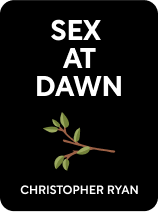

This article is an excerpt from the Shortform book guide to "Sex at Dawn" by Christopher Ryan and Cacilda Jethá. Shortform has the world's best summaries and analyses of books you should be reading.
Like this article? Sign up for a free trial here .
What is partible paternity? Do cultures that practice partible paternity prove that humans are naturally promiscuous?
In their book Sex at Dawn, authors Ryan and Jethá look to modern foraging societies that practice partible paternity (the idea that more than one man can be the biological father to a child) as evidence that humans are not meant to be monogamous. One group they cited as evidence is known as the Ye’kwana people.
Continue below for Ryan and Jethá’s argument about partible paternity and promiscuity.
Evidence From Foraging Societies
The authors of Sex at Dawn, Ryan and Jethá, use evidence from modern foraging societies to support their arguments against the standard narrative of human sexuality. These societies are geographically isolated from other people and still practice the type of hunter-gatherer lifestyle that our prehistoric ancestors did. The authors present two aspects of modern foraging societies that cast doubt on the standard narrative: partible paternity and non-nuclear families.
(Shortform note: There are about 30 modern foraging societies that we know of. However, as of 2018, there were also roughly 100 uncontacted tribes in the world. Because these tribes have avoided or rejected interactions with outsiders, we don’t know for sure whether they embrace the same hunter-gatherer lifestyle as early humans did.)
Partible Paternity
According to Ryan and Jethá, one way that modern foraging societies refute the standard narrative of human sexuality is through partible paternity, or the idea that more than one man can be the biological father to a child. This argument arises from the fact that people in some remote South American foraging societies understand pregnancy and conception differently than people in most other societies do: They think pregnancy is the result of ongoing deposits of semen rather than a single sex act. Therefore, the authors argue, pregnant women in these cultures will seek out a variety of men with different desirable genetic traits for sex because they believe that each man’s semen will contribute to the baby’s genetic heritage.
(Shortform note: According to some anthropologists, partible paternity beliefs exist along a spectrum for people in remote South American foraging societies. That is, people in some such societies wholeheartedly believe in partible paternity, while people in other, similar societies believe a child can only have one biological father. Researchers note that many people in these societies fall somewhere in the middle: They believe that partible paternity is theoretically possible, but that it’s better for a woman to reproduce with just one male partner.)
As a result of this practice, everyone in the community sees all of these men as biological fathers of the resulting child. According to the authors, each of the men is therefore responsible for providing for that child—which ultimately increases the child’s chances of surviving to adulthood. The authors believe this illustrates an important point: While paternity certainty might be important for individual men in some societies, a lack of paternity certainty may be better for the society as a whole. When men don’t know which children are their own, they have a vested interest in providing for all the children in their social group.
(Shortform note: There is a natural limitation to the idea that men who can’t identify their biological children will be more invested in all the children in their community: It only applies in small, isolated groups, like the bands prehistoric humans lived in. In these groups, it’s likely that at least some of the children in the group are any given man’s biological offspring, giving men motivation to care for these children. However, in larger or more interconnected groups, there’s a much smaller chance of any one child being any particular man’s biological child, giving men less reason to invest in all the children they meet.)
| Partible Paternity and Promiscuity Some reviewers have argued that the mere existence of partible paternity isn’t enough to prove Ryan and Jethá’s point about which mating system is most “natural” for humans. For example, one group of evolutionary anthropologists and psychologists argued that “the existence of partible paternity in some societies does not prove that humans are naturally promiscuous any more so than the existence of monogamy in some societies proves that humans are naturally monogamous.” However, if human sexuality develops in response to social context—and if modern foraging societies are socially similar to ancient foraging societies—we can assume that ancient humans probably did have some concept of partible paternity and a similar non-monogamous approach to sex. |
Non-Nuclear Families
Prtible paternity contributes to another way that foraging societies refute the standard narrative: a lack of traditional nuclear families. In modern foraging societies, children often have both multiple fathers and multiple mother figures. While everyone in the group knows who an infant’s biological mother is, women in the mother’s extended family will also nurse the baby. As they grow, children are free to wander from house to house, where each adult will care for them as they would their own children. The result is a diffuse sense of parental responsibility: Each adult acts as a parent to each child in the community, regardless of any biological relationship between them, because community bonds outweigh individual parent-child bonds.
Ryan and Jethá believe that this evidence—coupled with the fact that, historically, nuclear families have needed significant help from tax breaks, religious edicts, and marriage laws to survive—undermines the idea of “natural” nuclear families. In human prehistory, it would have been unthinkable for a couple and their children to try to fend for themselves without the help of the community.
(Shortform note: The authors argue that prehistoric humans wouldn’t have relied on nuclear family arrangements because the task of raising and providing for children was too difficult for two parents to manage without outside help. However, this argument fails to take into account the fact that families can both be nuclear and receive outside help. For example, it’s possible for nuclear families to live in close communities with their extended families. In that case, parents get extra help taking care of their children, but they’re still recognized as the parents—the nuclear family still exists. For all we know, our ancestors could have had similar arrangements.)
| Foraging Societies Raise Happier, Healthier Children As part of their argument, the authors cite evidence from a number of foraging societies, including the Ye’kwana (sometimes spelled Ye’kuana) people of modern-day Venezuela and Brazil. Ryan and Jethá only focused on the aspects of the Ye’kwana child-rearing methods beneficial to basic survival, but other researchers have noted that these methods also carry important psychological benefits. In the mid-twentieth century, American writer Jean Liedloff lived with the Ye’kwana for several years. Liedloff found that, in addition to a diffuse sense of caregiving responsibility, the Ye’kwana people employed a number of unique parenting practices, including cosleeping and breastfeeding on demand. Liedloff observed that the Ye’kwana children were happier and more self-confident than their American counterparts. Liedloff concluded that these benefits were the result of raising children in alignment with their bodies’ evolved expectations. For example, before car seats and strollers existed, babies spent most of their time in the arms of a loving adult. Over time, infants evolved to depend on this contact to help regulate their internal temperature and heart rate. Liedloff believed that when evolutionary expectations like this aren’t met—for example, when babies spend most of their time in strollers, bouncers, or cribs instead of being held—children aren’t able to thrive. Furthermore, the lack of emphasis on nuclear families in societies like the Ye’kwana enables these evolutionarily sound parenting practices—when the whole community takes responsibility for childcare, there’s always someone available to hold the baby, even if the child’s mother and father are busy. |

———End of Preview———
Like what you just read? Read the rest of the world's best book summary and analysis of Christopher Ryan and Cacilda Jethá's "Sex at Dawn" at Shortform .
Here's what you'll find in our full Sex at Dawn summary :
- Why everything we think we know about prehistoric human sexuality is wrong
- Why so many marriages end in divorce
- How humans are designed to be polygamous






